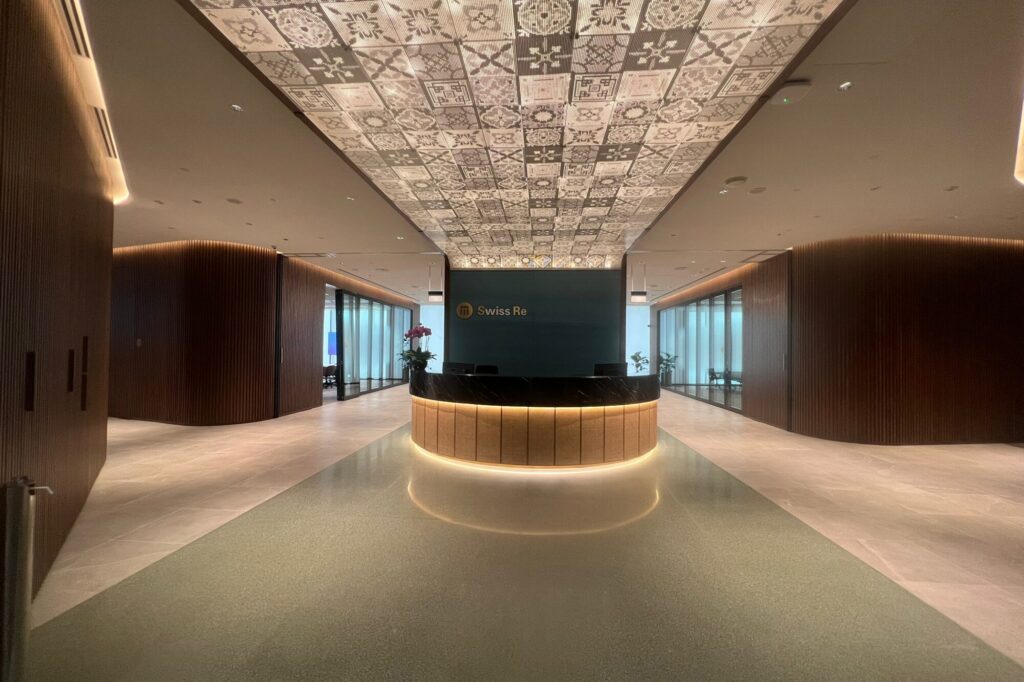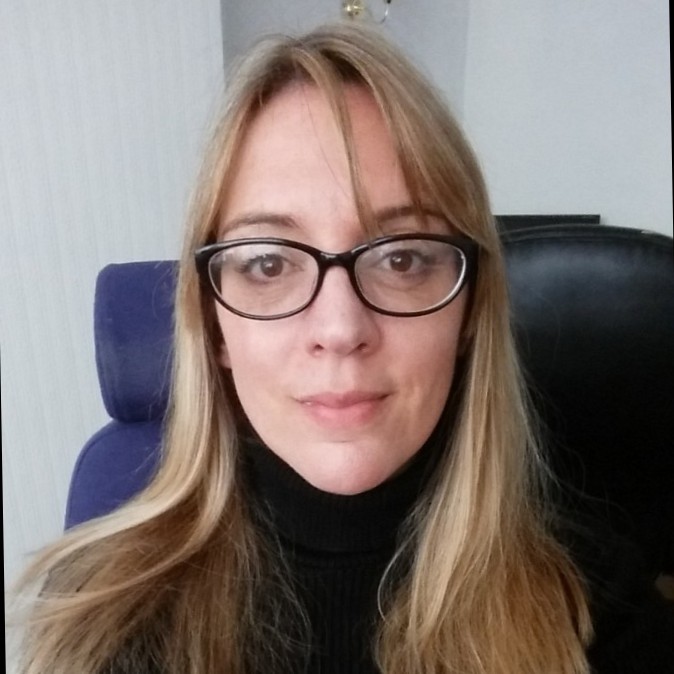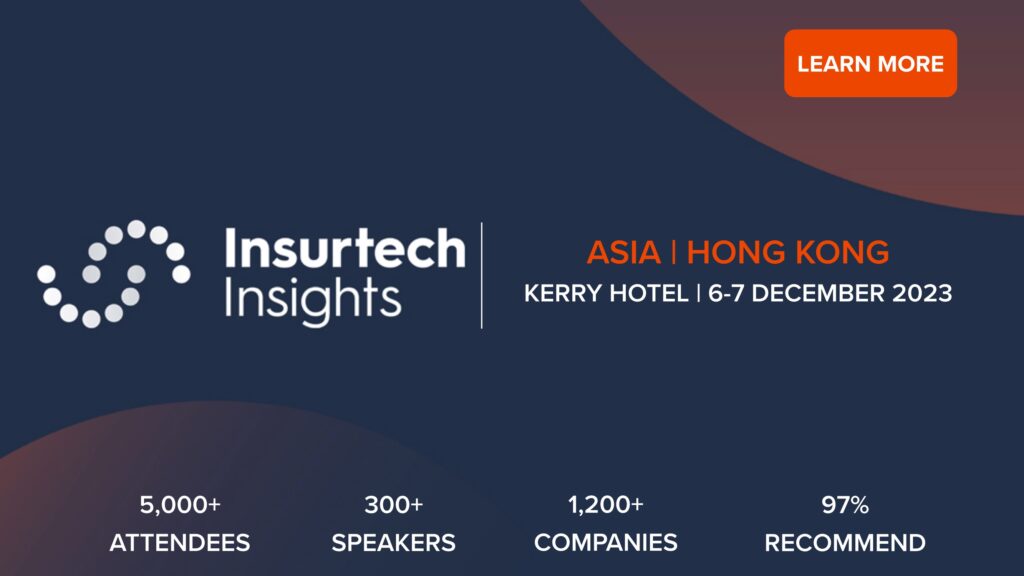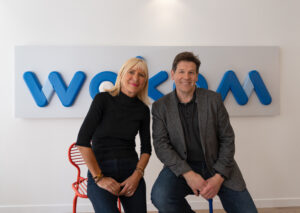Effective August of this year, Lauren Liang stepped into the role as the Global Head of Growth and Innovation for Swiss Re. She and her team cover the innovation efforts for both the Property and Casualty, as well as the Life and Health businesses. They are part of Swiss Re’s Reinsurance Solutions division, which offers a suite of tools and services spanning the entire insurance value chain from bespoke consulting services to software solutions, and advanced data and insight capabilities.
Lauren and her team’s mission is to help clients grow their business by applying innovation principles and practices to develop new solutions. They do this with a laser focus on clients, as they work to identify and transform what their needs are. The team is responsible for identifying client pain points and converting that information into innovative solutions that span the insurance value chain. Those innovations can be either client specific or they can be applicable for all insurers across the entire industry.
However, Lauren, like most prominent leaders in the insurance space, spent many years in other industries before she found a home in the insurance space. Insurtech Insights caught up with her.
You’ve had a very interesting journey into the insurance space. Can you tell us a bit about that process?
Yes. More than happy to. I’ve had a very unlikely journey, not just in insurance, because over the course of my career I’ve worked in quite a few industries as well as functions. However, the recurring theme throughout my career has been the fact that I’ve gone through these industries with different functions, and have always been lucky to land in those industries just as they encounter – or are in the process of being disrupted.
One of the things that I really enjoy is learning about these different industries and experiences and discovering how to embrace the ambiguity and the uncertainty that comes with change. And it is a skill that you pick up over time with practice. Some people enjoy dealing with ambiguity and being “out of your comfort zone”. And I’m lucky enough that I happen to enjoy the ride as I go from industry to industry.
How did you start out? And what was the doorway into the insurance business?
I graduated from the University of Michigan Ross School of Business with an accounting degree and joined the US conglomerate, General Electric. Because of my accounting background, I started as a financial analyst and an internal auditor in their leadership development programmes. After four years and going through quite a few roles and industries within that conglomerate, given their wide business spectrum, I was eventually deployed to NBCUniversal, GE’s media arm then.
As a result of 9/11, the two transmitter antennas on top of each of the World Trade Centre towers were destroyed. This was a critical impact to NBC, because back in the day, many people still relied on the good old fashioned antennas on the top of their televisions to tune in to broadcasts, and if people couldn’t watch TV, businesses were also handicapped in their advertising reach – so the knock on impact was significant. I was asked to help NBC file a property and business interruption claim – and that was one of my earliest exposures to insurance.

Working in the wake of the disaster – and helping to address the issues that resulted from 9/11 – must have been quite an experience. What led you to stay the course toward insurance and innovation?
It really was! That was also the time when NBC had just started to encounter the startups that we know today as YouTube, Google, Yahoo, Facebook. And within the company, we were trying to figure out what our next move was, because up until that point, television had been the largest consumer marketing and advertising medium. I spent a lot of time working alongside really smart folks at NBC trying to figure out how to work with these new internet companies. It was a very interesting experience.
Then, in 2007, my family and I relocated to Singapore and I was fortunate to have the opportunity to set up the Asia office for NBC Universal’s corporate venture capital arm. The timing was incredible because that role led me to visit China frequently for work. And that experience provided me with a front row seat to witness the giants of today (Alibaba and Tencent and the like) take off – and what it took for them to create that success.
I later moved on to Nielsen to eventually lead as the Head of M&A for Asia Pacific. At that time, big data was very much the hot topic that everybody wanted to talk about. And so again, it was a role that saw us try to figure out how to grow – with what kind of candidates and who to partner; we had a company that is very well known, and we had incredible data, but we hadn’t really figured out how to pursue data analytics.
In 2015, MetLife invited me to interview for a digital partnerships role for Asia based at their innovation lab in Singapore. Once again, the timing was perfect because that was when insurtech and talk of disruption actually began in Asia and particularly in the life and health industry. I spent five years there, and led a team of innovators to incubate new services directly for customers, particularly in the health and wealth space. So that’s a little bit of the journey that I went through. It’s been incredibly fun.
Given your broad perspective and experience with disruption and innovation, what are the most significant challenges and opportunities currently in the re/insurance industry?
What I’ve observed is that every industry that goes through a disruptive period wrestles with the same things. They wrestle with new technology, they wrestle with data, they wrestle with new business models. They also wrestle with startups appearing. But to be quite honest, these are really good challenges because from the new technologies and business models come growth opportunities for the entire industry.
What’s really, really key, and again this is consistent across all industries and insurance is not exempt from it, is how do you navigate? That’s always the most challenging and is certainly so in the insurance industry – how do you adapt behaviours and values to support a company through that ambiguity, change, and disruption that make people feel uncomfortable?
How can businesses alleviate the stresses caused by facing these challenges?
I believe there are three crucial behaviours that can significantly enhance our work, but I must admit that they are often easier said than done. The first one is agility, which means having a bias for action. Secondly, we should be open to experimentation, constantly pushing ourselves to try new and different things. Lastly, it’s essential to acknowledge that failure is part of the process.
Therefore, we should embrace failure and make a deliberate effort to learn from it. When we fail, it’s an opportunity to gather valuable insights that can guide our future actions. These behaviours present challenges, but if our company can fully embrace them, it will enable us to effectively navigate the growth driven by new technologies, innovative business models, and the fresh perspectives that startups bring to our industry.
You’ve amassed a wealth of experience in partnerships and collaborations. What are the key elements required to ensure success within a partnership and how does Swiss Re sustain those relationships?
Well, there are three things that I consider absolutely crucial. In our constant search for partners or when we’re approached by potential partners, I focus on three key aspects.
First and foremost, I examine the use case, regardless of how impressive the technology or service may be. Is there a clear, practical use case? For example, let’s take generative AI, a current buzzword. A concrete and easily grasped use case could involve leveraging generative AI to provide customers with a superior experience compared to human call centre interactions.
On the other hand, a vague use case that is less actionable, might pose a broader question like, ‘How can we employ generative AI in our industry?’ So, it’s essential to frame the use case with a specific purpose and a desired outcome, rather than let it be simply driven by the technology itself.
Secondly, I assess the potential partner. It’s crucial that both parties recognise what they bring to the table. What are Swiss Re’s strengths, and where might we have gaps that the partner can fill? A thriving partnership often hinges on understanding how we complement each other effectively.
Lastly, the third factor that I believe is pivotal to the success of a partnership is a shared set of values. It’s relatively straightforward to make progress and achieve success when everything is going smoothly. However, in the realm of innovation, you’re bound to encounter obstacles and challenges. In those moments, having a trusting relationship and being in sync on how to tackle and surmount those hurdles is paramount.
So, I’d say these three elements aren’t solely technology-focused; they encompass values and shared beliefs, which become especially critical once you move beyond defining the use case itself.
In your role as Global Head of Growth and Innovation, how are you tackling the challenges surrounding ESG regulations?
This is indeed a hot and continuously evolving topic. The environment is changing both in a literal sense and in its broader implications. To illustrate, I can share a few examples of how we collaborate with insurers.
We analyse the impact of climate change and offer solutions to help clients comprehend the associated physical risks. We delve into questions like expected insurance losses and how they evolve with changing climate patterns. Additionally, we explore risks stemming from greenhouse gas emissions. We also examine insured risks linked to Environmental, Social, and Governance (ESG) considerations. For instance, we assess how the adoption of electric vehicles alters the risk profile of an insured fleet of cars. My team plays a pivotal role in navigating this ever-shifting landscape, helping us understand our clients’ specific needs.
Our primary focus is on identifying the “job to be done” for our clients. We support the risk assessment process and assist in framing the challenges they face. Consequently, when we provide these solutions to our clients, they can transform these risk assessments into actionable insights to enhance their portfolio management and refine their market strategies.
In terms of deployment, we offer these solutions in three ways. First, through consulting services tailored to our clients. Second, we have proprietary Swiss Re applications that clients can subscribe to and install. Third, clients can seamlessly connect to our ecosystem via APIs. We believe in providing options because we recognise that clients value flexibility. Our goal is to not only deliver these solutions effectively but also ensure that we adapt to the client’s preferred mode of receiving insights.
What sets Swiss Re apart from its competitors in terms of approach, growth and innovation?
In our sector, we consider our competitors to be primarily technology and data analytics service providers (to insurers).
What truly distinguishes us is our deep understanding of risk, which is our foremost strength. This recognition of our expertise extends not only within the insurance industry but also transcends industry boundaries. That’s one key differentiation.

Moreover, our credibility in the realm of risk knowledge has allowed us to establish a robust network within the insurance ecosystem. This network provides us with valuable insights into the industry’s evolving landscape. It also offers us opportunities to share our perspectives. As evidence of this, you can see some of our insights reflected in reports like Swiss Re’s annual SONAR report, which explores emerging trends within the industry.
What inspires you in the insurance space today?
When we step back and examine the insurance industry’s value chain, both in property and casualty, as well as life and health, we understand that clients are primarily seeking three things: growth, profitability, and opportunities for efficiency. We’ve made significant strides in identifying the essential tasks across these value chains that matter most to insurers.
By combining this understanding with current tech trends and available technology, along with emerging risk pools, there’s substantial potential for growth. The key questions then become: with numerous companies and startups working in this space, where do we begin, and how do we proceed?
From our perspective, it’s always client-driven. We follow where our clients want to go. We don’t have to innovate in isolation. Being client-led is one aspect, but having worked across various industries, I know that partnering is an effective approach. Additionally, learning from the experiences of other industries is invaluable. Many industries have traversed similar paths before us, so it’s essential to extract lessons and insights from their journeys and apply them to the insurance industry.
This aligns with our tagline, “Evolve Beyond.” It serves as a constant reminder that we must break free from the traditional ways of approaching our business and the technologies we use. Instead, we should embrace a more diverse range of lessons learned and knowledge from other industries that have faced similar challenges.
It takes courage to adapt these lessons and integrate them into the insurance industry where they make sense, and that’s a path we are actively exploring.
Interview by Joanna England

Joanna England is an award-winning journalist and the Editor-in-Chief for Insurtech Insights. She has worked for 25 years in both the consumer and business space, and also spent 15 years in the Middle East, on national newspapers as well as leading events and lifestyle publications. Prior to Insurtech Insights, Joanna was the Editor-in-Chief for Fintech Magazine and Insurtech Digital. She was also listed by MPVR as one of the Top 30 journalist in Fintech and Insurtech in 2023.









